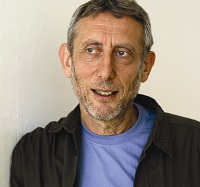
The Missing: An Interview with Michael Rosen
Nicholas Tucker interviews Michael Rosen about his new book.
 The Missing details the search the writer, poet and broadcaster Michael Rosen undertook to discover more about two great-uncles, Oscar and Martin, who were victims of the holocaust. One was a clock-maker, the other a dentist, and both lived in wartime France. They were hardly ever mentioned within the family post-war and other information about them was hard to find. Even by the end of the book we still only know just a little more. So why did he decide to write it?
The Missing details the search the writer, poet and broadcaster Michael Rosen undertook to discover more about two great-uncles, Oscar and Martin, who were victims of the holocaust. One was a clock-maker, the other a dentist, and both lived in wartime France. They were hardly ever mentioned within the family post-war and other information about them was hard to find. Even by the end of the book we still only know just a little more. So why did he decide to write it?
It was because I knew so little about them it was important to search for more. I didn’t want them simply to disappear. That would have been a victory for the Nazis. I do quite a lot about the Holocaust in schools, and the story of the search and the gradual way things came together also seemed like a good extra tale to tell.
How do you find talking to young people about the Holocaust?
Quite a few children know who I am, this weird chocolate-cake person going on a bear hunt, so I think they might listen to me on this. Otherwise they might simply get little more than dates and numbers when it comes to discussing the Holocaust in schools.
You describe how the French authorities would routinely impound the possessions of the Jews they deported.
They had warehouses packed to the rafters with stuff seized. After the war they left these centres open and people used to just come in and grab whatever they fancied. The French have only recently acknowledged that the Vichy government was the official government of the day. Before that they would maintain they had no responsibility for what happened during the war. This meant they could reject any claims for compensation.
What about that remark by the German philosopher Theodor Adorno, to the effect that there can be no poetry after Auschwitz? There are number of your own poems in the book.
I think he was feeling that humanity itself had come to an end with the Nazi atrocities. But I was a post-war kid and my parents were both optimistic people. The schools that I went to were also very forward-looking, with lots of talk about a New Elizabethan age and all that this promised. It was a very positive time to be alive, and this sense of optimism helped shape my own outlook. But I can see how older people with first-hand experience of what it was like in Nazi Germany could well have felt like giving up on everything cultural they once took for granted, including poetry.
Did your parents talk to you about the Holocaust when you were young?
Not much. But when we went as a family to East Germany in 1957 my parents one day announced to me and my brother that they were going to this camp called Buchenwald. My Mum said you can’t come because it is too horrific: it was where people were tortured and killed. I was eleven at the time. When Mum came back her face was grey. But that was that- no more discussion. I remember later on she was once cross with me and a friend for doing silly German accents and mimicking Hitler moustaches. She didn’t often shout but this time she really did: ‘Millions of people have died because of them, you know!’ But after that I think it was only when I got to university that I truly began to contemplate what had happened and its huge implications.
Are you going to do anything more on this theme?
I’ve collected together the poems I have written on this topic in the last ten years or so, including the few I have quoted in The Missing, some of which are only fragments. This will make a follow-up book along with a few anecdotes and stories. It’s coming out in October and will be tied in with issues arising from present-day immigration and persecution. Quentin Blake has come up with some incredibly powerful accompanying colour wash and line drawings, nothing like his normal comic stuff.
And with that I leave Mike to get on with all the other myriad media and writing projects he has been involved with over the years, not to mention regular school visits and workshop sessions. The Missing is not a depressing story. It includes a lot about his own childhood, leaving any discussion of Holocaust horrors to other pens. That he managed to get so much nearer to his otherwise forgotten great-uncles is also oddly cheering, given the obstacles facing him at the start of his search. They now once again have an existence, albeit on the printed page. The story of how this came about is also one that deserves to be remembered.
Nicholas Tucker is honorary senior lecturer in Cultural and Community Studies at Sussex University.
The Missing is published by Walker Books, 978-1406386752, £12.99 hbk
Here are ten books chosen by Madelyn Travis to introduce children to the Holocaust.





